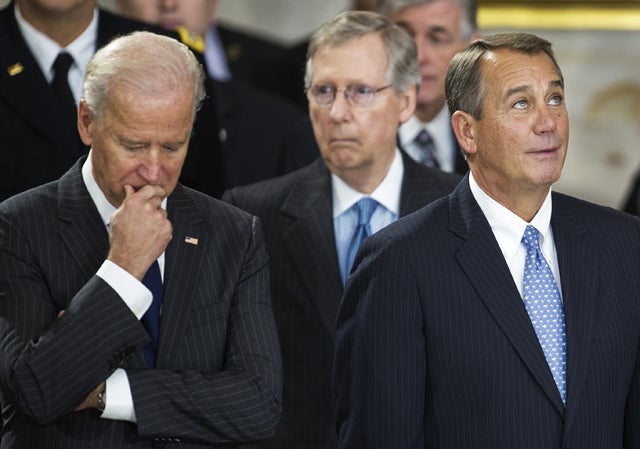Washington is in the midst of another budget fight this fall over the nation’s debt limit. What some call political brinksmanship others recognize as an important forcing mechanism to rein in out-of-control federal spending and avoid a much worse debt crisis in the future.
Dan Mitchell of the Cato Institute, a former Heritage fellow, is in the second camp. Mitchell gave testimony on “The Economic Costs of Debt-Ceiling Brinkmanship” in front of the Joint Economic Committee last week. Here are three key insights from his speech:
- Government spending is the true root of the government’s fiscal problems. “Simply stated, the true fiscal tax on our economy is how much government is spending,” Mitchell said. Government expenditures divert money from the economy’s productive sector. The way the government finances it—such as by driving deficits or incurring debt—is really a secondary problem caused by excess spending.
- Lawmakers should adhere to the “golden rule” of fiscal policy: ensure that private economic output is growing faster than government spending. “Nations such as Greece, for instance, got in trouble because the politicians did the opposite,” and allowed spending to outpace private-sector growth, leading to a financial disaster. Mitchell identified entitlement spending, which is set to balloon as America’s population grows older, as the biggest and most dangerous threat to the golden rule in the U.S. Entitlement reform should be a top priority for Congress. Mitchell asks: “Wouldn’t it be a good idea to take steps today—when it’s relatively easy—to avoid that potential future crisis? To at least begin to steer away from the cliff?”
- Congress does not have to raise the debt ceiling to avoid default on the debt. “The federal government is collecting far more in revenue than what’s needed to pay interest on the debt,” Mitchell explains. Indeed, interest payments are roughly $230 billion per year, while federal tax revenues are almost $3 trillion per year, leaving plenty of leeway to service the debt. The government can simply prioritize interest payments to bondholders and hold back on payments to others to avoid a default on the debt.
The debt limit plays an important role in confronting Congress and the President with the result of their unsustainable spending decisions. The limit should act as a wake-up call to correct the fiscal course before a much worse debt crisis forces drastic policy changes that would do much more harm than deliberate reforms made today.
Mitchell concludes with an optimistic perspective on the debt limit debate: “If some brinkmanship today means spending in the future won’t grow as fast, then the nation will be in a much stronger fiscal position.”
Michael Sargent is currently a member of the Young Leaders Program at The Heritage Foundation. For more information on interning at Heritage, please click here.
